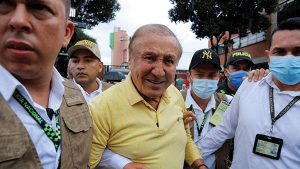Bloomberg
Gustavo Petro ceded his front-runner status for Colombia’s presidency to a little known 77-year-old construction magnate, in a sign of how voters are increasingly willing to gamble on untested leaders who promise change.
Rodolfo Hernandez’s surprise surge to place second in the election sets up a June 19 runoff with Petro, a former mayor of Bogota whose program includes proposals to phase out the oil and coal industries.
Petro, 62, had been tipped as the favourite to become Colombia’s first leftist leader, but the upset prompted other candidates to quickly offer Hernandez their endorsements, potentially tipping the balance in his favour. Markets were expected to rally after a holiday on the belief that anyone would be better than Petro.
The outcome turns the tables on Petro, who portrayed himself as an agent of change unlike Federico Gutierrez, the conservative candidate seen as embodying the policies of the outgoing administration who placed third and failed to make the runoff.
“The uncertainty is now multiplied because we face a candidate who wants a deep change in policy and the other where we just don’t know what he proposes,†said Mario Gomez, managing partner for Colombia at public affairs and business consulting firm Prospectiva. “That fear and panic that Petro produces is so strong, that now it’s just about give me anything, just not Petro.â€
Now, Petro, whose political journey took him from guerrilla to the capital’s mayor and a senator, suddenly faces a genuine outsider in Hernandez, a businessman with a short temper, foul mouth and populist tendencies whose only political experience is as onetime mayor of the provincial city of Bucaramanga. “Today we have to decide what kind of change we want, whether to commit suicide or advance,†Petro said on stage during his campaign rally flanked by his wife, children and vice president.
In a sign of his potential unease at facing Hernandez, he repeated a campaign
line Gutierrez had deployed against him, saying that “we can’t jump into the void.â€
The result shakes up the presidential race in Latin America’s third-most populous country after voters in Peru and in Chile elected
unconventional presidents within the last year.
It’s another indication
of how the desire for change driven by inequalities that were exposed by the pandemic.
 The Gulf Time Newspaper One of the finest business newspapers in the UAE brought to you by our professional writers and editors.
The Gulf Time Newspaper One of the finest business newspapers in the UAE brought to you by our professional writers and editors.
